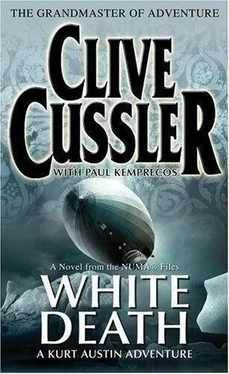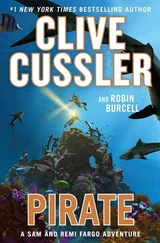"I smell a trap." "You've got a better nose than Martinez, although in fairness, he
was probably distracted by thoughts of all the fun he was going to have burning Diego and his crew."
"Shades of Custer's Last Stand. That cave system is a labyrinth. Perfect to stage an ambush."
"Then I'm sure you won't be surprised to hear that's what hap- pened. It was a two-pronged strategy. The caravel swept down on the warship and cowed its skeleton crew with a few cannon shots. Then they boarded the ship and took it over. Meanwhile, Diego launched his ambush. He had dragged one of his ship's cannon into the caves and used it to take the wind out of the attack." Perlmutter raised a pudgy fist as if he were reliving the battle. "Brasero was a skilled swordsman, but Aguirrez was better. Instead of killing him, he toyed with Martinez before he doused Brasero's flame forever."
"Where was Mr. Blackthorne in all this?"
"One of Brasero's men went to take a shot at Diego. Blackthorne killed the man. Diego had his men bring Blackthorne to him. The Englishman laid out his story. Diego needed a skilled captain to command the warship, so he made a deal. Blackthorne would take charge of the ship and get Diego's men home safely. Several weeks later, by Blackthorne's account, he sailed up the Thames with his prize."
"What happened to the Roland relics?"
"Blackthorne never mentions them. But by his account, Diego called for a small volunteer crew to stay with him and sent the oth- ers home with Blackthorne. Diego no longer needed gunners and cannon crew, only skilled sailors. Even with Brasero dead, he knew the relics would not be safe as long as the Inquisition was alive. So he continued west, never to be heard from again. Another unsolved mystery of the sea."
"Maybe not/' Austin said. He handed Perlmutter the news clip about the zeppelin crash.
Perlmutter read the story and looked up. "These unusual 'items' Heinz mentions could be the long-lost relics."
"My thoughts exactly. Which means they're in the hands of Oceanus."
"Would Oceanus give them up?"
Austin thought of his run-ins with the Oceanus thugs. "Not likely," he said, with a rueful chuckle.
Perlmutter gazed at Austin over tented ringers. "It seems there is more to this whole saga than meets the eye."
"A hell of a lot more, and I'll be glad to tell you all the gory details over another cup of coffee." Austin lifted his cup. "As long as you're up, old boy, could you fetch me a refill? Get one for yourself."
AUSTIN ARRIVED THREE minutes before his appointed meeting time with Aguirrez. After leaving Perlmutter's house, Austin drove down Embassy Row. The gods that look over Wash- ington drivers were smiling, and he found a parking space with no trouble. He walked along Pennsylvania Avenue until he stood in front of a square building that consisted of several dark-glass stories grafted onto some old Washington houses. Austin read the sign next to the front door and wondered if he had the wrong address. Given the troubles the Aguirrez family had had with the Spanish authori- ties through the centuries, the last place he would have expected to find Balthazar was at the embassy of Spain.
Austin gave his name to a security guard at the door and was passed on to the receptionist, who punched out a number on her in- tercom phone and spoke in Spanish to someone on the line. Then she smiled and, in a lovely accent that evoked visions of Castile, said
"Mr. Aguirrez is with the ambassador. He'll be with you in a mo- ment."
A few minutes later, Aguirrez came strolling out of a hallway. Aguirrez had shed his blue sweat suit and black beret and was im- peccably dressed in a dark-gray suit that would have cost Austin a week's pay. But even the best of tailors couldn't hide the peasant hands and sturdy physique. He was talking to a snowy-haired man who walked beside him, hands behind his back, head lowered in thought as he listened intently to what the Basque was saying. Aguir- rez saw Austin and waved at him. The two men broke off their con- versation, parting with warm handshakes and smiles. Aguirrez
strode over to where Austin stood and wrapped an arm around his shoulder.
"Mr. Austin," he said cheerfully. "How nice to see you again. I'm sorry I didn't introduce you to the ambassador, but he was late for a meeting. Come this way."
Aguirrez led Austin down a hallway to a door into what had been a drawing room in one of the old houses that were part of the em- bassy complex. The centerpiece was an oversized marble fireplace, and the room itself was comfortably appointed with plush rugs and heavy, dark wood furniture. Oil paintings of Spanish rural scenes decorated the walls.
As they took their seats, Aguirrez evidently noted the wondering look on Austin's face, because he said, "You look puzzled, Mr. Austin."
Austin saw no reason to beat around the bush. "I'm surprised to find you here-a man accused of being a Basque terrorist within the walls of the Spanish Embassy."
Aguirrez didn't seem offended. "You have obviously looked into my background, which I expected, so you know that the accusations have not been substantiated."
"Still, I noticed that you're not wearing your black beret." Aguirrez gave out a booming laugh. "In deference to my hosts, I have shed my chapeau, although I miss wearing it. I think that some in this building might think I had a bomb under the beret, and their nervousness would interfere with our work."
"Which is?"
"To settle the Basque problem peacefully once and for all."
"That's a tall order after hundreds of years of conflict."
"I'm confident it can be accomplished."
"What happened to your ancestral quest?"
"The past and the present are inseparable in this cause. The Basque separatists want a homeland. The Spanish government has experi- mented with autonomy, with unfortunate results. If I find the relics I am looking for, their discovery could set off an emotional wave of Basque nationalism. I know my people. It would tear Spain apart."
"So you have suddenly become very important to the Spanish gov- ernment."
He nodded. "I have met with high-level officials in Madrid who asked me to inform your State Department people of the situation and assure them I am not a terrorist. I have agreed, once I find the relics, to put them in safekeeping."
"What's to prevent you from going back on your word?"
The Basque frowned, and a dangerous expression came to his dark eyes. "It is a logical question, and one the Spanish government also asked. I told them that I will honor the memory of my ancestor, who was chosen to be the guardian of the relics. In return, the Span- ish government will take graduated, meaningful steps toward Basque autonomy."
"You're using the relics as leverage?"
He shrugged. "I prefer to call it a solution that takes into account our mutual interests."
"Not a bad deal, considering the fact that you don't have the relics."
"A technicality," he said, the broad smile returning. "I have un- earthed information on the sea routes my ancestor took to the New World. The Basques were in the Faroes as early as 875. After stop- ping at the Faroes, Diego would head for Newfoundland or Labrador. There is ample precedent for this theory. My people fished for cod and whales off North America as far back as the Middle Ages."
"I've read that Cabot found Indians using words that could have had a Basque origin."
"No doubt about it!" he said, his face flushing with excitement. "My research indicates that there are some unexplored caves near Channel-Port aux Basques in Newfoundland. I will rejoin my yacht there as soon as I clear up my business here, and I am convinced that before long I will hold the sword and horn of Roland in my hands."
Austin paused, wondering how he could gently break the news, then decided that it could not be done. "There may be a problem," he said.
Читать дальше












